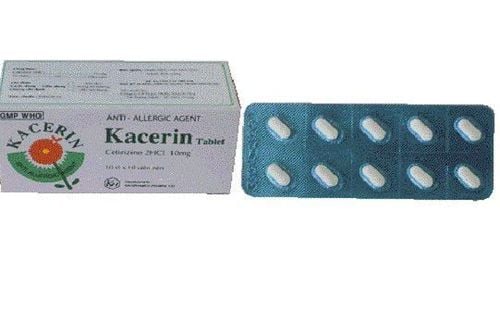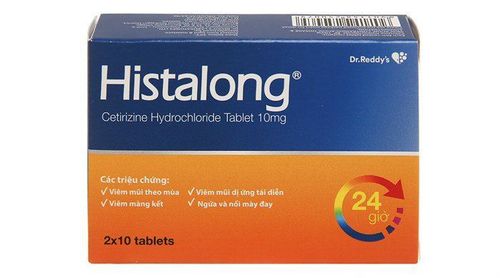This is an automatically translated article.
Medocetinax is often prescribed in cases of allergies. How the drug works and how to use it, please refer to the article below.
1. What is Medocetinax?
Medocetinax belongs to the group of antiallergic drugs and is used in cases of hypersensitivity. The drug is prepared in the form of film-coated tablets and packed in boxes of 10 blisters, each blister of 10 tablets. Medocetinax contains the main ingredient Cetirizine Hydrochloride 10mg. Unit Medopharm - India is the manufacturer of the drug.
2. Uses of Medocetinax
Cetirizine Hydrochloride is a potent antihistamine with antiallergic effects, but does not cause drowsiness at pharmacological doses. This active ingredient has a selective antagonistic effect at the H1 receptor. However, it has almost no selective antagonism at other receptors, so there is almost no serotonin antagonism and no acetylcholine antagonism. Cetirizine inhibits the early stages of histamine-mediated allergic reactions and reduces the release of late-stage allergic reactions.
3. Indications for the drug Medocetinax
The drug is applied in the treatment of allergic manifestations such as: seasonal and non-seasonal runny nose, allergic rhinitis, skin diseases that cause itching due to allergies, chronic urticaria, allergic conjunctivitis.
Pharmacodynamics of Medocetinax:
Cetirizine Hydrochloride is an H1-receptor antagonist antihistamine. Pharmacokinetics of Medocetinax:
Following a single dose of 10 mg, plasma concentrations peak at 0.3 mcg/mL after 30 to 60 minutes, with a plasma half-life of approximately 11 hours. Drug absorption between individuals did not change. The elimination half-life is approximately 9 hours and the renal clearance is 30 ml/min. Cetirizine has a strong binding to plasma proteins about 93%.
4. How to take Medocetinax
The drug is in the form of tablets that should be taken orally. The recommended dose for adults and children 12 years of age is 10mg per day.
5. Contraindications to Medocetinax
People who are allergic or sensitive to Cetirizine Hydrochloride or other ingredients of the drug. People with impaired kidney function.
6. Medocetinax drug interactions
When co-administered with Theophylline, the clearance of Cetirizine is slightly decreased.
7. Side effects of Medocetinax
Some side effects may occur when using Medocetinax such as: Dry mouth, drowsiness, dizziness, mild gastrointestinal disorders. In rare cases, high blood pressure has been reported.
8. Some notes when using Medocetinax
Not recommended for people who need high concentration such as driving or operating machinery; Avoid using Cetirizine with other CNS depressants or alcohol because it can cause decreased alertness; For the elderly, it is necessary to adjust the dose reduction; People with liver and kidney failure need to adjust the dose; It is not recommended to use Medocetinax for pregnant or lactating women because it can affect the fetus and young child. Care should be taken to store the medicine in a cool, dry place and avoid direct light. Above is all information about Medocetinax, patients need to carefully read the instructions for use, consult a doctor / pharmacist before using. Note, Medocetinax is a prescription drug, so patients should absolutely not self-medicate at home because there may be unwanted side effects.













